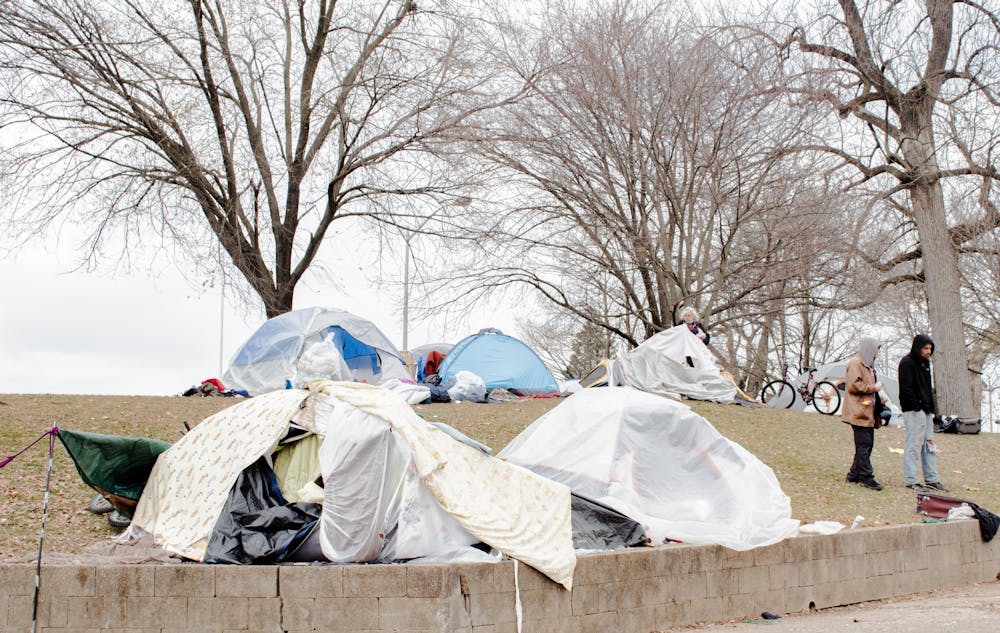The Bloomington Board of Park Commissioners unanimously passed a ban on “camping structures and makeshift enclosures” in Bloomington parks during the daytime that went into effect last Wednesday, Aug. 23. The policy points to issues with these structures making parks unwelcoming environments to other members of the Bloomington community and creating health and safety concerns.
I agree that the use of enclosed structures and accumulation of hazardous materials or waste in public spaces does create a problem of accessibility and safety for these parks. That being said, the ban on these structures is simply a band-aid on the issue of housing insecurity that many Bloomington residents face.
In a 2021 Bloomington community survey, just 3 in 10 residents gave excellent or good marks to the city’s care for vulnerable populations, such as the elderly, disabled and those facing homelessness.
The problem of homelessness often comes with other problems like poverty, food insecurity, addiction and crime. When cities and communities focus primarily on intolerant, quick or simple “solutions” to these problems, the overall issue only grows deeper and harder to truly remedy.
[Related: Policy prohibiting tents, other enclosed structures in public parks now in effect]
People are not setting up tents and enclosures in Bloomington’s parks from a selfish perspective or to make the space inaccessible for others. They simply have little to no other options for shelter — a basic human need. Without an established place to live, like an apartment or house, humans must turn to creating their own simply to survive.
On any given day, Bloomington may experience wind, harsh sunshine, intense heat or rain. All of these weather conditions can be uncomfortable and unsafe to endure without some form of shelter — inducing sunburns, heat exhaustion or stroke, damage to belongings and other health and safety issues.
Pushing houseless populations out of parks by prohibiting makeshift shelters does not magically create somewhere more ideal or permanent for them to live. At best, the problem is just harder for some of us to see.
Although the Bloomington Parks and Recreation Department does not have the jurisdiction to actually house residents, they should be working in conjunction with the Common Council and other departments like Housing and Neighborhood Development and Planning and Transportation to create long-term plans of action to house Bloomington residents before enacting policies that have the potential to uproot and displace community members.
[Related: OPINION: There's no goodwill in capitalism]
Many large cities, like New York, are notorious for the implementation of hostile architecture — a style that physically creates uncomfortable, unwelcoming spaces. Features like spikes, bolts and slanted angles are used to discourage people from actually using spaces that might otherwise be good for sitting or lying down.
I envision a Bloomington that rejects this harsh approach to the use of outdoor spaces. Public areas should be used by the public, after all — something that can be encouraged through the intentional creation of clean, safe and welcoming environments. It’s clear that Bloomington’s Board of Park Commissioners believes this too from the reasoning behind their policy.
But, if the city of Bloomington truly wants to create long-lasting public spaces, including parks that feel accessible to all residents, our government departments must work together to house and otherwise aid residents who are unhoused and perhaps face other issues of food insecurity, joblessness or addiction.
We cannot turn a blind eye to our most vulnerable and ignored populations. Helping them helps us all create a more resilient community. Bloomington, and the rest of American society, should strive to cultivate a culture of compassion, empathy and mutual aid among our people.
Leila Faraday (she/her) is a sophomore majoring in policy analysis with minors in geography and urban planning and community development.






